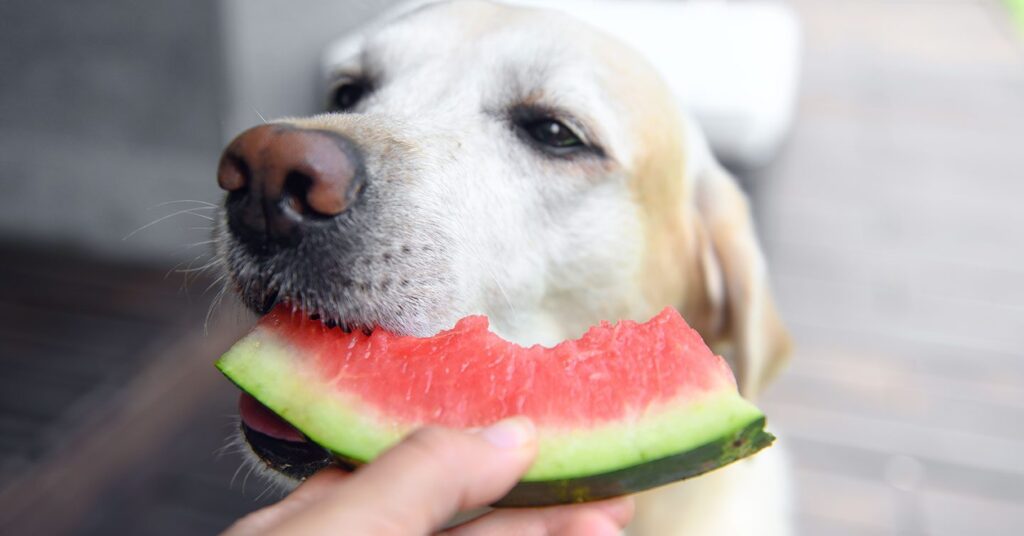The summer season brings with it many delights, including the sweet, juicy taste of watermelon. While many of us enjoy this delicious fruit, our canine companions may also partake in the summertime snack. However, understanding how much watermelon a dog can eat is essential to making sure their health is not compromised. Given the unique nutritional needs of dogs, it’s important to explore the risks and benefits of watermelon consumption before serving it up. The goal of this blog post is to help pet owners make informed decisions about how much watermelon to feed their dogs. We’ll provide some helpful tips and recommendations to ensure that your pup gets the most out of this summertime snack without any health risks. So let’s get started by exploring how much watermelon a dog can eat safely.
Find food that fits your pet’s needs
If you enjoy this juicy treat but have refrained from sharing it with your dog out of concern that it might not be good for them, your instincts were partially correct. Watermelon is a delicious picnic staple, sure, but is watermelon safe for dogs? If fed to dogs properly, watermelon can actually be a healthy treat for them.
 The fleshy pink fruit of a watermelon is loaded with healthy nutrients that are as beneficial for humans as they are for our canine companions.
The fleshy pink fruit of a watermelon is loaded with healthy nutrients that are as beneficial for humans as they are for our canine companions.
Watermelon is rich in potassium and vitamin C, and its also a great source of vitamins A and B6, according to Dogtime. It also contains fiber, which can aid healthy digestion. This fruit contains no cholesterol and almost no sodium or fat. While watermelon does contain sugar, it is mostly made up of water, and should not cause any unhealthy spikes in blood sugar. Because its 92% water, it makes it both a sweet treat and a creative way to help your dog stay cool and hydrated during the summer..
The flesh of a watermelon is a safe and nutritious treat for dogs, but the other parts of the fruit arent all right for your pooch to eat. According to the American Kennel Club, if dogs swallow watermelon seeds, the seeds can cause an intestinal blockage — which is not only painful for your dog but could become serious enough to require surgery to correct.
While a few seeds won’t likely result in health issues for large dogs, many seeds can result in a blockage in small dogs.
Giving your dog the rind of a watermelon, which is the tough, green outer skin, is also not a good idea because doing so could result in gastrointestinal distress and vomiting or diarrhea. Although the fruit of the watermelon is a nutritious treat in moderation, eating too much of it may cause your dog’s stomach to become upset.
What are the health benefits of watermelon for my dog?

Watermelon is rich in antioxidants, potassium, vitamins C, B6, and A. It’s also packed with Lycopene and high fiber. In fact, the Watermelon Promotions Board, a department of the USDA, considers watermelon a superfood. Even though it’s 92% water, besides being a superb choice for hydration on a scorching day, the high nutritional value of watermelon makes it one of the best choices as a healthy snack for both you and your dog.
Let’s explore the advantages of watermelon for your health in more detail:
What are Some Risks From Eating Watermelon for Dogs?
Watermelon may carry some risks for dogs because their digestive systems were not designed to process large amounts of fruit like ours are.
The rind and seeds may upset their stomachs, and the fruit itself may be consumed in excess can also be harmful.
The same nutrients that make watermelon healthy for dogs can also make them sick in large doses, resulting in nausea, vomiting, and diarrhea.
For instance, while the fiber in watermelon insulates the sugar and prevents it from being released too quickly into their bloodstream, too much fiber can interfere with the absorption of nutrients and cause stomach upsets.
Likewise, your dog may still have trouble digesting the high sugar content. When consumed in excess, some nutrients, like Vitamin A, can lead to a variety of health issues, such as dehydration, joint pain, or even artery degeneration.
FAQ
How much watermelon can a dog have a day?
To prevent obesity and diabetes, treats and watermelon should only make up 10% of your dog’s diet. Your dog may experience stomach upset, constipation, or diarrhea if they consume too much watermelon. As a snack, smaller dogs should consume much less than larger dogs.
Is too much watermelon bad for dogs?
Watermelon should be given to your dog in moderation, just like any other treat. Overeating watermelon can give your dog diarrhea, constipation, or an upset stomach. If consumed excessively frequently and in large quantities, it can even cause obesity and diabetes over time, according to Trupanion.
Will watermelon give a dog diarrhea?
An upset stomach, constipation, diarrhea, or even long-term obesity and diabetes can result from consuming too much of any one treat, including watermelon. Remember to limit your dog’s diet’s treats, like watermelon, to 10% or less.
Why does my dog love watermelon so much?
Dogs enjoy the texture and hydration of watermelon, but this juicy fruit also provides them with extra vitamins and minerals. The most crucial point to keep in mind is that they can digest the red and light green fruit that is contained inside the watermelon rind (and even benefit from it).